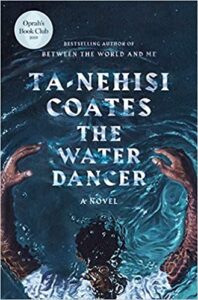Ta-Nehisi Coates
Fiction 2019 | 402 pages
![]()
I was intrigued to read how the enslaved Black man Hiram Walker refers to the land-owners as "Quality." Slaves are "Tasked." "Low" refers to low-class whites. Those sent down to be sold are “gone Natchez-way.” The novel explores the dehumanizing effects of slavery, focusing on the emotional and psychological toll it takes on individuals and communities.
We begin when Hiram is still a child and follow him into adulthood. He is so brilliant, so real, so aware and conscientious, that he is brought to his white enslaver's home, the home of Howell Walker, to care for the house and his idiot of a son Maynard, through his white wife. Though both Hiram and Maynard are sons of Howell, Hiram is the son of one of Howell's slaves, Rose.
In The Water Dancer‘s opening pages, Rose returns ... this time as a phantasy figure on a stone bridge, her hips dipping and swaying to invisible music, an earthen jug “fixed on her head like a crown.” Hiram has no memory of her or the day she was taken away ... which pains him ... but does see her magic. Hiram has two supernatural powers. He has a literal perfect memory, and he has the gift of Black magical realism, a supernatural gift of travel through space and time, which allows him to remember the past and alter the present.
It is easy to get lost in Coates' lush language. The story pulls you in and along. As Hiram runs from the Walker home, he encounters many trials but is ultimately connected with the Underground. For all I thought I knew about the Underground, The Water Dancer taught me so much more. I have greater perspective and knowledge about how the Underground extensively planned for those they helped transition from slave to free man. A slave did not just run to a certain place and wave a flag and be transported.
Hiram Walker is recruited into the Underground and uses his powerful memory and begins to understand how to harness his other, more mystical, powers and put them to good use. And that good use involves escaping from slavery and helping others, through challenge and triumph, to do so as well.
Coates’ characters are rich and deep. I particularly like that he can write female and male characters with equal insight. There are many powerful women in this book, including some who are buried deep in slave-owner families who, following their truth and heart, are invisible abolitionists. Some reviewers were put off by the magical realism. I was not. It added a layer to this story that would have rendered it incomplete if it was left out.
This is not an easy read, nor a quick one, but it is a novel that will stay with you, and make you think, and I do surely recommend it.
April 2025

